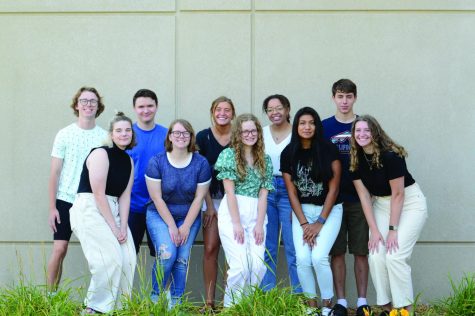Noem’s veto on industrial hemp undermines SD agriculture industry
March 19, 2019
Hemp plant can be used to make body oil and lotions, candles, paint, clothing, biodegradable plastic, paper, construction materials and biodiesel fuel. Because of this, cultivating hemp can bring in a ton of profit to farmers nationwide.
The bill’s sponsor, Oren Lesmeister, D-Parade, said our Founding Fathers first required farmers grow hemp.
Regardless of its numerous uses, Gov. Kristi Noem vetoed House Bill 1191 on March 11. The next day, Senate attempted to override her veto, but the legislation failed by four votes.
The bill initially passed in both the House and Senate by an overwhelming majority. Only two representatives voted against the bill in the House and only 14 senators voted against it in the Senate.
Gov. Noem justified her veto with claims that normalizing hemp would make legalizing marijuana inevitable in South Dakota, and would make law enforcement’s job more difficult.
Hemp and marijuana are two different things. According to an article on medium.com, hemp and marijuana look identical to the untrained eye, but with a little education about what to look for, they have very distinct features that distinguish them from one another.
Gov. Noem’s argument that police aren’t ready to take on extra training is a lazy excuse not to support the industrial hemp bill, but it’s a valid one. In Idaho, a man named Denis Palamarchuck was stopped and detained for transporting more than 6,000 pounds of hemp. He was kept in jail for four days but was released after posting a $100,000 bail.
This could have been avoided if Palamarchuck had been carrying a transporter license, something that is mandatory in Kentucky.
Regardless of the fact that police can be trained to distinguish between the plants, Gov. Noem doesn’t place much trust in South Dakota’s law enforcement — and that’s why she continues to fight against a bill that many farmers and South Dakota residents wanted.
We, at The Collegian, believe Gov. Noem is disregarding her constituents’ desires and holding back agricultural innovation in South Dakota.
Agricultural success is a huge part of South Dakota’s economy, and it’s a huge part of South Dakota State University’s curriculum. Our university just invested in a Precision Agriculture building, a progressive approach to agricultural education. South Dakota’s governor, however, is not making strides toward progressive agriculture.
Ironic, since agriculture is South Dakota’s largest and most profitable industry — generating more than 20 percent of the state’s economic activity and employing more than 80 thousand South Dakotans.
The National Conference of State Legislatures reported that at least 41 states have hemp growing and production programs in place, and South Dakota farmers wanted to be added to that list.
“We don’t have to be last all the time,” said Sen. Troy Heinert, D-Mission, before the vote.
The fact of the matter is South Dakota is ranked 17th in the nation in crop production, and if we don’t keep up with the industry, other states will soon pass us on that list.
The Collegian Editorial Board meets weekly and agrees on the issue of the editorial. The editorial represents the opinion of The Collegian.






















